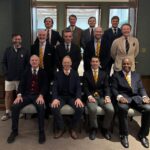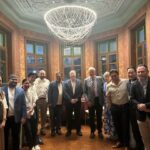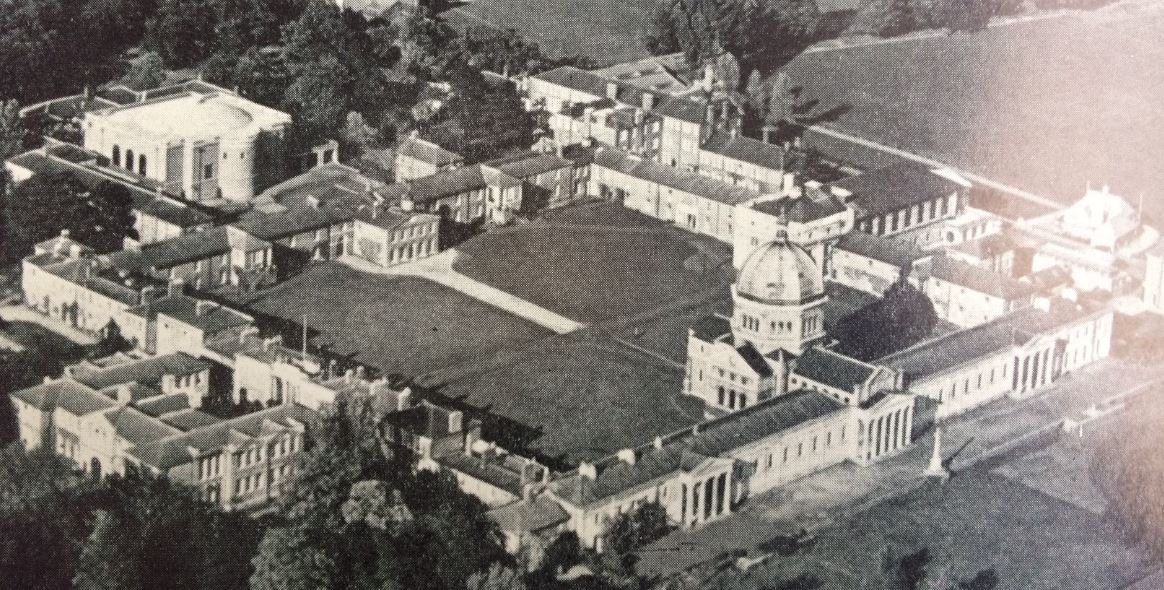We were delighted to hear from Nick Coates (L 48) recently about his time spent at Haileybury at the tail-end of the 1940s. It’s a world away from the current Haileybury yet Nick’s words evoke the atmosphere of excitement at winning a scholarship and, as an American, learning about rugby and cricket. We let Nick tell his own story…
Learning is a treasure that will follow its owner everywhere – Chinese Proverb
As I approached my 90th birthday I reflect on the fond memories of the year I spent at Haileybury and Imperial Service College in Hertford, England. Somewhere down the line the school dropped Imperial Service College from the name, and they didn’t even consult me!
It was 1947 and I had been selected as one member of a group of 22 US private school students who were awarded a full scholarship to attend an English Public School. No one could explain why these elite English private schools were called Public Schools. And no one could explain to me why I was chosen to join this select group. I had a good scholastic record but was not in the top 5% of my class. I was on the varsity football, basketball and track teams but there were far better athletes. I was active in student government but not a class officer. The only thing I can figure out was that I had been selected because I was a “typical” student.”
On the Queen Mary
New York City was a long way from my home in Kansas City, still I found my way and joined 21 other English-Speaking Union students boarding the Queen Mary for our trip to England. In those days, the Queen Mary was a three-class ship and we were, of course, relegated to the lowly tourist class with cabins at the bottom, just above the hull. Of course that did not prevent a group of curious teenagers from exploring the entire ship. On arrival in Britain, it presented a magnificent sight – I felt that Monet must have painted the grass in Southampton. I had never seen grass that lush and green!
Haileybury at last

(Above: Lawrence and Big School – a view which Nick would remember well)
When they showed me my cubicle in Lawrence House, the Haileybury school term had started two weeks earlier. They obviously did not expect too much of me academically for I was assigned courses with the boys who were destined for state colleges, not Oxford or Cambridge.
And it was just as well because I found the academic level was far higher than it was in the US. Also, there was a language problem. In fact, for the first few days, I was not always sure what class I was attending as the accent was so strong, I wasn’t sure they were speaking English. Of course they were speaking English and I was speaking American.
A different world
At my US school I had shared a room with two others but now I found I was sharing with 40 others. Each of us had a cubicle separated from its neighbor by a short 3-foot wall. A cubicle contained a bed, a chest of drawers and a footlocker. The youngest students’ cubicles were at one end of this large room and the more senior students at the other. I was shocked to learn that the 10-year-olds at the far end served as “fags” and were required to shine shoes and do other errands for the more senior students housed at the other end of the room.
I was quite proud that I had a picture of my US girlfriend for my dresser. To the best of my knowledge I was the only one in the dorm that had a girlfriend. The British may have been miles ahead of us scholastically, but they were way behind socially. It seemed that the opposite sex was seldom discussed.
Falling in love with rugby
There was a strong sense of community, team play and sportsmanship at Haileybury. I was eager to join the house rugby team and I felt welcomed right from the start. Rugby football is a distant relative of American football. Since players played without all the American padding, I assumed it was not as rough, but I was very wrong. There were no substitutions and no timeouts. I had to unlearn hanging on to the ball after being tackled.
If you did not immediately release the ball you would be penalized. So, when tackled you release the ball but keep your body between the ball and the opposite team because, once you were down, a scrum would form and the biggest guys on both sides would try to kick the ball back to the smaller runners. Once I got the hang of it, I fell in love with rugby and I was pretty good.
I was on the track team but I never had a chance at cricket which, to play properly, a player must start in grade school. But I did learn that cricket was not a game for sissies and the ball was harder than a baseball, and no one wore gloves. It takes nerve to be standing less than 10 feet from the batsman who could hit the ball as hard as any baseball, yet you had to handle it barehanded!
Cultural exchanges
My house mates and I had many cordial debates about the merits of our countries. The craziest debate was over which country was correct about the side of the road they drove on!
What I hadn’t thought about until I arrived in England was how much they had suffered during the war. Although the war had been over for two years, the rationing in England was far worse than in the US at the height of the war. Meat, shoes, butter, everything was rationed, and no one complained about it. I never liked Brussels sprouts but we sure ate a lot of them. There was the usual casual griping about the food, but it was good-natured. Serving that limited a diet in the US would cause rioting in the streets.
If any of my schoolmates remember me, they probably remember me for introducing popcorn into their diet. My parents had sent me a bag of popcorn and a bottle of popping oil. There was a stove near our study – a separate building – for making tea. I found a pan, put in the oil to heat and added the popcorn. Think about it. If you have never seen popcorn pop, it is truly unbelievable.
In trouble with the Master
The British school year makes far more sense than ours does. Our school year was designed when they needed the kids to work on the farm, so we have long summer vacations, so long that kids get out of the routine of school. The British have a more enlightened system of a month vacation at Christmas, a month in the spring and about six weeks in summer. This meant that when July 4 came along, all my US buddies were sailing and swimming and I was still in the classroom. Being the only American in the school I felt I had to make a statement. I took a toll slip and magic markers and made an American flag. That was the easy part. The hard part was sneaking out a window and climbing across the roofs to raise the flagpole that graced the entrance. There it was waving proudly the next morning. Of course, no one could guess who the culprit was.
I was not surprised when I had a summons from the Head of school that morning. I figured that he would not be as upset with me for raising the flag as he would be for my breaking curfew and risking my neck climbing across the roofs. The traditional punishment was caning where you were bent over a desk and received as many as 10 lashes with a cane. I wasn’t looking forward to that but was prepared. Instead he gave me a worse punishment. I was required to write a 1000-word essay on the futility of the American Revolution. The Head was a good sport and sent the flag back to my mother who had it framed.
Aftermath
In those days international phone calls were prohibitively expensive and, to my knowledge, we did not even have a phone accessible to students in the school. I hadn’t talked to my mother for almost a year so when I called her from New York she recognized my voice, but thought I was putting her on because I had a strong English accent. That was gone within a week.
Unlike US schools I did not hear anything from Haileybury for at least ten years. There were no fund-raising letters, no alumni publications, and I don’t believe there was an alumni organization. I tried to contact my classmates, but this was long before the days of the internet. I wrote a couple of letters to the school requesting contact information but had no success.
Can you help?
Nick would love to hear from anyone who was at Haileybury when he was there (1948-9) and who remembers him. If you would like to be put in contact with Nick, please email the Society here.
More from The Haileybury Society
- £500 Travel Grant Awarded for Clinical Placement in Peru – Emily Jacobs (M13)

- World Champions & OHs Take to the Court at Queen’s

- Design, Politics and Discovery: A Solo Journey Across Europe

- Running for Mark: Barcelona Marathon Fundraiser

- Haileybury Society Bangkok Reunion

- SAVE THE DATE – concert by the Gents of St John’s College

Unless otherwise stated, all content and images on this website and blog © The Haileybury Society, 2024, all rights reserved
Search stories by date
Unless otherwise stated, all content and images on this website and blog © The Haileybury Society, 2024, all rights reserved
